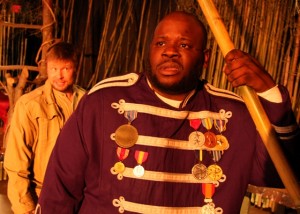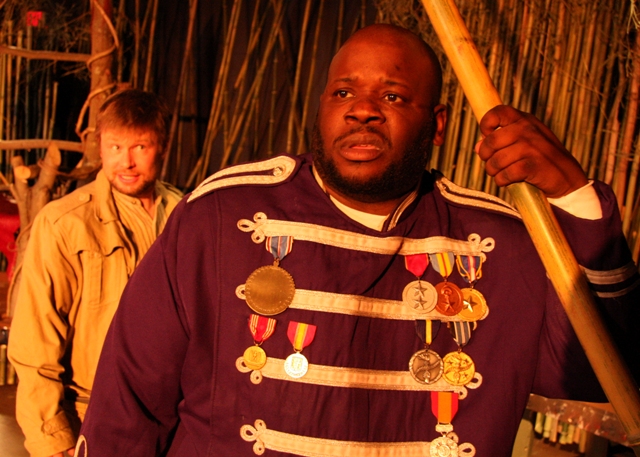In its almost 20 year history, Iron Age Theatre Company has not played it safe. They produce unique new works—always a gamble—and aren’t afraid to tackle difficult classics. Their current production continues this mission. Written in the 1920s, THE EMPEROR JONES was O’Neill’s first major hit—unexpectedly so. The piece was created for the small experimental company The Provincetown Players, a group O’Neill became involved with in 1916. The company, comprised of such radical free spirits as Louise Bryant, John Reed, Emma Goldman and Susan Glaspell, summered in Provincetown on Cape Cod. O’Neill, floundering through life, arrived from New York’s Greenwich Village with “a trunkful” of short plays. It was Reed who encouraged him to pursue the craft further and push the boundaries of conventional theatre.

(l. to r.) Smithers, Luke Moyer, warns Brutus Jones, Kash Goins, of the dangers that lie ahead as he tries to escape the revolution in The Centre Theater's THE EMPEROR JONES by Eugene O'Neill. (Photo credit: John Doyle)
O’Neill’s poetically titled plays were among the first to introduce techniques of realism into American drama. He was greatly influenced by Chekhov, Ibsen and Strindberg, and his dialogue was among the first to be written in the vernacular of everyday Americans—street talk as it were. Albee, Mamet, Wilson, Shepard and Letts owe him a tremendous debt of gratitude; without O’Neill, their styles of writing would probably not have been produced.
He is also one of the first American playwrights to explore life’s dark side—its underbelly. His characters live on the fringes of society, engaging in depraved behavior. They struggle to maintain their hopes and aspirations, but ultimately slide into disillusionment and despair. THE EMPEROR JONES is no exception. Basically a morality tale, the play tells the tale of Brutus Jones, an African-American who (while working as a porter on a train) kills a man and is sent to prison. Jones escapes to a Caribbean island and sets himself up as emperor—becoming more harsh and cruel a master than any superior he ever accused of being such. The play recounts his story in flashbacks as Brutus makes his way through the jungle in an attempt to escape former “subjects” who have rebelled against him.
Obliquely commenting on the U.S. occupation of Haiti that was a topic of debate in that year’s presidential election, the play creates an uneasy mix of expressionism and realism, using elements of voodoo and Christianity. As Jones attempts to make his way through the island jungle one night, his rebellious “subjects” use the incessant beat of the voodoo drums to drive him slowly mad. He rediscovers his Baptist faith during the course of the harrowing night, but eventually kills himself rather than fall victim to those chasing him. It was O’Neill’s first play to receive great critical acclaim and box office success, and the one that launched his career. It was also extremely controversial—for two reasons: it was the first play to feature a black person in a lead role and the “N” word is used liberally throughout the script (something that is even more objectionable today).
Director John Doyle and company jump right in without fear. Kash Goins plays the title role with great passion—he is essentially doing a monologue for the bulk of the 70 minute performance as Jones thrashes through the jungle. This is exceedingly difficult as the actor is basically thinking out loud, which could easily get boring. And must be very daunting for the performer; at least with a “direct address” type of monologue, you get to feed off of the audience. Fortunately, Goins and Doyle seem to have found a variety of colors and levels to play with—and I’m sure this will grow as the run progresses. The next largest part, the British Smithers, is portrayed by Luke Moyer—a very engaging performer. He is a great foil for Goins. It’s an odd role—he tries to lord it over Jones, but comes across as very ineffectual and insecure. Not an easy thing to portray, but Moyer handles it quite well. Rounding out the company are Tiffany Joyner, Richard Steven Bradford, Maurice Tucker and Joshua Matthew Cameron. All perform the movement and chorale work beautifully. My companion and I found the pantomime of a slave auction quite compelling.
I have seen a number of productions at Iron Age over the years, and I have always been impressed with their design sensibility and how they use their space. I was not disappointed this time. Randall Wise, their resident set designer has created a multi-faceted “jungle” set utilizing movable units of bamboo that get reconfigured throughout the piece to represent various parts of the island. The changes were not always smooth, however; I would recommend choreographing them more to add to the mysticism of the atmosphere. Mr. Wise (assisted by Lisa Doyle and Jayne Burt) also created the fine costuming and Mr. Moyer the wonderful masks. Ben Levan’s lighting design is suitably eerie, although at times it was a little too dark to see Mr. Goins’ face. The sound design—predominantly live native drumming—was most effective, building to a frenzy as the play drew to its inevitable climax. John Scaduto, John Grosso and director Doyle—kudos.
Iron Age is quite inventive in utilizing their assets and overcoming their liabilities. I applaud their choices. It was an enlightening experience to see a piece of classic American theatre by one of the great playwrights and I can recommend investing the time to go to Norristown to see this piece.
Interesting footnote: Jasper Deeter, founder of Hedgerow, was in the original cast of THE EMPEROR JONES. The two became friends and colleagues, and Deeter not only portrayed Smithers in the original production at the Provincetown Playhouse in Greenwich Village, but was responsible for convincing O’Neill to cast a black actor in the title role, rather than a white actor in blackface, which had been his original intention and the custom of the era. The result was a breakthrough work in American theater on a multitude of levels that transcended the theater. Deeter and O’Neill parted company, however, over the decision to move the play uptown, rather than keeping it at the playhouse in Greenwich Village, as Deeter urged, and using it as the basis for establishing a repertory company. He felt O’Neill and the producers were squandering the chance to build something that could last for many years longer than the simple Broadway run of a play. It was shortly after this that Deeter came to Rose Valley and started his own repertory company.
THE EMPEROR JONES
by Eugene O’Neill
Directed by John Doyle
March 3 – 27, 2011
Iron Age Theatre Company at
The Centre Theatre
208 DeKalb Street
Norristown PA 19401
610-279-1013
www.ironagetheatre.org


